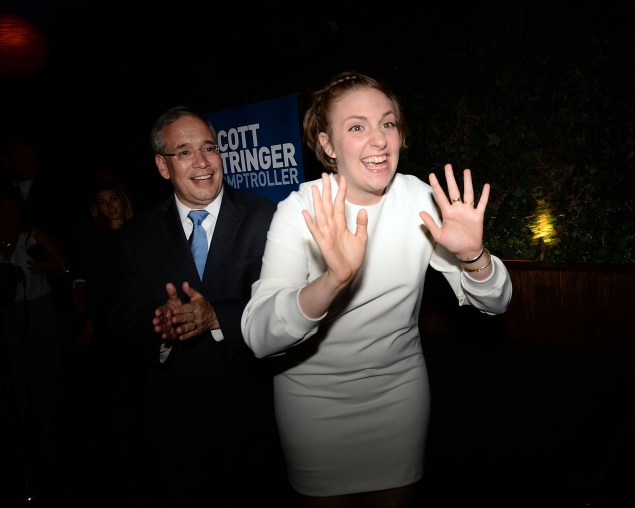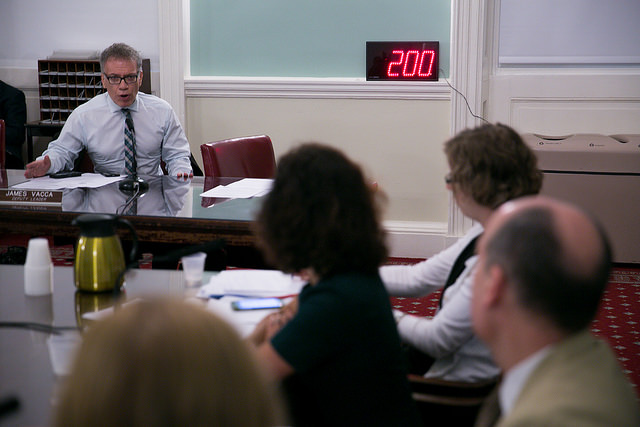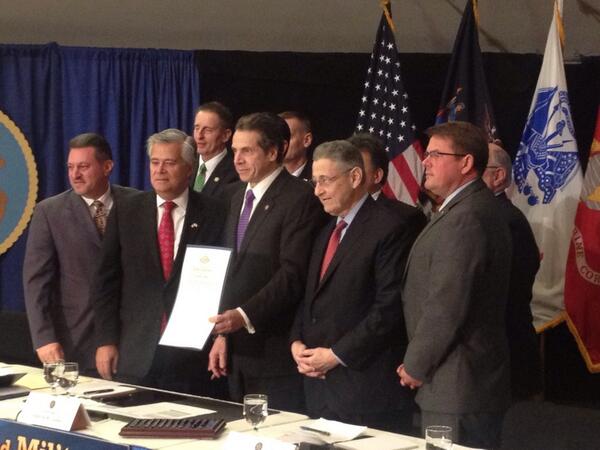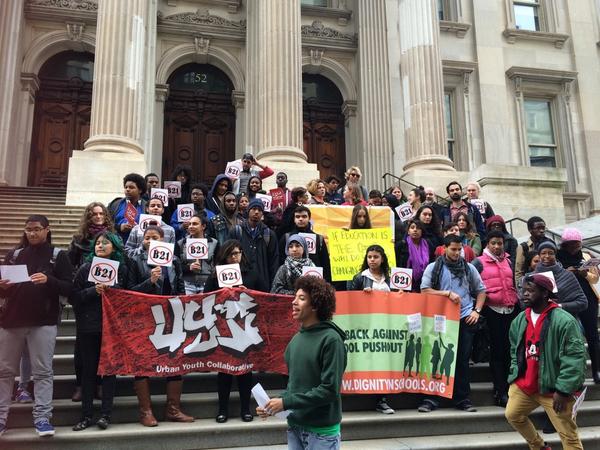
Comptroller Stringer at a press conference (photo: Comptroller's Office)
A look at Scott Stringer as City Comptroller - which is what again?
Thanks to Eliot Spitzer, a lot more New Yorkers know the city has a Comptroller.
That's what the man who defeated the former governor in a dramatic 2013 Democratic primary says, anyway, as he intently discusses his efforts to engage the public during his first year as the city's chief financial officer.
New York City Comptroller Scott Stringer reveled in his surprising victory over Spitzer last September and his subsequent general election win to become one of three city-wide elected officials. And now, almost a year into his tenure, there's no indication Stringer has anything but relished his new role.
"There is real opportunity to maximize helping people in the city in so many different areas, in all five boroughs from all backgrounds, from kids to seniors," Stringer said of his position in a recent interview with Gotham Gazette.
Stringer appears enthusiastic despite comptroller having been his second choice of new jobs after deciding to leave the Manhattan borough presidency after two terms to briefly run for mayor. Embracing the vast powers of his new office, which employs well over 700 people and has an operating budget of $88.3 million, Stringer is able to make an impact, raise his profile, and even let a little steam out of his bottled mayoral ambitions.
2014 has been a prolific year for the new comptroller and his team, even as it has included a major learning curve for Stringer and much of the staff he brought with him from the borough president's office. The job of Comptroller can be highly technical and requires command of a wide range of financial, investment, and accounting knowledge; it touches virtually every aspect of city government and public life.
Quick studies who have been able to lean on many highly-experienced auditors, economists, and analysts, Stringer and his team have unveiled a handful of headline-grabbing initiatives and announcements while regularly rolling out less flashy but highly important reports.
"We are pushing a responsible progressive agenda," Stringer said. "In the first year I'm going to be able to point to some real success on behalf of the people of the city."
Stringer quickly rattles off achievements: provoking new City funding of arts education by identifying major gaps in its offering; sounding the alarm on limited City business going to firms owned by women and people of color; holding Sandy rebuilding forums around the city and exposing problems with the Build it Back program; saving taxpayers millions of dollars by refinancing debt; and holding the mayor accountable on budgeting and pre-kindergarten-provider contracts. He's made the city's public housing system a major focus, saying that a full audit of NYCHA (the New York City Housing Authority) will be unveiled by year's end.
Stringer said he and his staff have approached their first year on the job with a serious sense of urgency, adding, "We increased the capacity of what the Comptroller's office can do."
Along with reports and audits, Stringer has leveraged interactive technological tools. He's launched Vendor Roadmap: A Guide for Doing Business with the City as well as the new ClaimStat system whereby claims against the City are tracked, with patterns identified in an effort to show agencies trouble spots and, ultimately, save the city money. Stringer has also enhanced Checkbook 2.0, the site by which city expenditures are shown publicly, a tool started under former Comptroller John Liu.
"Scott's off to a very strong start," Liu said when asked to assess what he's seen from his replacement thus far (Liu opted not to seek re-election, running for mayor instead). The former comptroller added that "it's too soon to tell" if Stringer is approaching the office much differently than he did. Both Stringer and Liu are unabashed liberals with a bend toward taking an activist approach to the duties of the office. Stringer has also continued to make a priority of interacting with constituents at public events around the city.
It has not been all smooth sailing for Stringer, of course, as the year has also been marked by the development of a public rift with Mayor Bill de Blasio.
Speaking at an October event, Stringer explained his approach: "Part of what I'm trying to do in the comptroller's office is hold the city government to that same [high] standard - to issue provocative reports; to sometimes break some eggs; sometimes agitate at City Hall. And I think that's the best of being a progressive reformer. You see if we all agree all the time and we're all sitting around congratulating ourselves about the next big idea then we're not gonna move the debate."
Stringer has 'agitated' at City Hall a few times this year and quickly embraced the "independent" moniker that is essential to his job as a fiscal watchdog. Stringer, however, has found himself in a unique situation from that of his predecessors, being a Democratic comptroller alongside a Democratic mayor.
Most notably on the egg-breaking front, Stringer challenged the mayor's accounting of certain aspects of a contract deal with the teachers union and very publicly called the administration out over the slow pace with which pre-kindergarten provider contracts were being submitted to his office for review.
Stringer was also critical of the mayor's issuance of an executive order to expand application of the City's living wage, paid to many workers involved with City-subsidized development projects.
Stringer has received praise for sticking to essential accounting and other principles, and for showing his independence. As self-branded progressives swept into power in each of the city's highest political positions, some worried there would be no checks or balances. While Stringer continues to agree with the mayor on the underlying goals of these initiatives and others, where he has taken issue and felt compelled to act has been in terms of process, as is incumbent upon someone in his position.
Critics wonder, though, if Stringer has approached his oversight of the de Blasio administration in the best manner, with grumbles throughout political corridors about the ambition the comptroller has shown, perhaps at the expense of teamwork.
Politics aside, praise for the merits of Stringer's work comes from important places.
"I think he's done a very good job in his first year," said Carol Kellermann, President of Citizens Budget Commission (CBC). Speaking recently with Gotham Gazette, Kellermann added that Stringer "got the ball rolling by requiring that the mayor attribute the money to be paid to teacher retirees be booked in the current year - that was a challenging situation in which he had to go and meet personally with the mayor and he didn't back down. I realize that's an insider issue in a lot of ways, but that was very important."
Kellermann added, "He established he was going to follow generally established accounting principles and wasn't going to allow any shortcuts or avoidance."
Others see a less rosy picture. Nicole Gelinas, a financial analyst and fellow at the right-leaning Manhattan Institute, says that Stringer's "biggest mistake so far - and it could come back to haunt us - is going too easy on de Blasio in this first budget."
While fairly complimentary of the comptroller in totality, Gelinas says that Stringer allowed the administration to account for retroactive payments to teachers in out-year budgets down the road when the money must have been included in the current budget. It is "not very good accounting, to put it mildly," Gelinas says of what she sees as paying for operating costs with debt, "[Stringer] should have pushed back on that much harder."
On the issue of the pre-k contracts, which deals with the mayor's signature program and Stringer brought to public attention on the eve of the city's opening of hundreds of new sites, Liu is among those who applaud the comptroller.
"Stringer was totally on the mark pointing out that so many contracts were so late," said Liu. "[The Comptroller] has to ensure proper checks and balances, he has to have time for fraud detection and to ensure safety measures. He was totally on point, you need these contracts."
On the comptroller's side of the issue, the story is that there was ongoing dialogue about the need for contracts to be submitted for review and that Stringer only went public when he absolutely had to. The flip side has people saying that the administration has followed standard operating procedure - that City business often gets done before contracts with providers have been completed and reviewed - and that the comptroller jumped at an opportunity to make headlines. All of the above may be accurate, of course.
Regardless of who you side with, the outcome is that Stringer and de Blasio are on much more distant terms than they were a year ago. Politically speaking, it is unclear if the distance will turn out to hurt Stringer or help him, but in practical application for the city, it mostly appears a benefit to have the Comptroller and the Mayor with a bit of healthy friction between them.
"Sometimes you have to stand alone in the name of being progressive and sometimes you have to be collaborative, and that is the balance I think about in this new role," Stringer told Gotham Gazette.
Double Dichotomy
In interviews and public appearances Stringer regularly hits on or hints at the two major dichotomies at play in his work: first, he aims to be both a responsible fiscal steward and a progressive reformer; second, he must both work collaboratively with the mayor and hold the administration accountable.
In conversation with Gotham Gazette, Stringer was quick to point out that his office has already worked with the mayor's Office of Management and Budget to refinance city debt and save "almost $1 billion," something Kellerman of CBC praised.
Stringer also notes that his office worked successfully with the administration (and the City Council) on addressing funding for arts education and on issues related to claims against the City. The comptroller said that he sees the new ClaimStat tool as something that will be an ongoing source of positive collaboration.
There is likely to be a continued question of style, though, which could keep things icy between Stringer and others in city government. The battle for headlines among politicians is as old as time, of course, and not unlike other elected officials, Stringer clearly wants to see his name in bold. A lifelong politico and an elected official since his 1993 move to the State Assembly, Stringer is no stranger to the media marketplace. Conversations with former Stringer staff members paint the picture of a passionate, caring public servant who is highly attuned to the PR value of virtually every action.
As Stringer pointedly told Gotham Gazette, he feels an "urgency of now trying to make a big impact," adding that term limits don't give you that much time (city officials are limited to two four-year terms).
Additionally, while most of his audits and reports thus far - such as Stringer's scathing profile of City contracting with women and minority-owned businesses (he gave the City a "D") - have mainly elucidated problems from the Bloomberg years, they will soon start to show deficiencies more attributable to the de Blasio administration.
Stringer said that the wisest new agency heads under de Blasio came to his office to request comptroller review, though he noted that few had done so.
Activist Approach
In terms of being a progressive reformer, Stringer is well on his way.
In early November, Stringer announced the Boardroom Accountability Project. It is "a national initiative" he is leading "to improve the long-term performance of American companies by giving shareowners the right to nominate directors using the corporate ballot," he explained in a recent Daily News op-ed.
The "progressive coalition" Stringer brought together has put on notice an initial group of 75 companies including Netflix, Urban Outfitters, and ExxonMobil. The companies, which public pension systems invest in through Stringer and similar officials elsewhere, have been targeted for action around "excessive CEO pay," a lack of "gender or racial diversity on their board," and negative environmental impact.
"I am investment adviser and a trustee of the city's $160 billion pension funds," Stringer wrote. "These funds own shares in nearly 3,500 U.S. companies, and we have a stake in ensuring that each one of them is making decisions that promote long-term, sustainable value."
Stringer and other investment officers around the country are responsible for protecting the pension funds of current and former municipal employees, as well as their beneficiaries. The number of these stakeholders in New York City's pension funds sits at about 700,000. The bottom line for most of these people is, well, the bottom line - but Stringer certainly has room for such shareholder activism, as long as the money continues to flow - and he argues that his progressive push will be beneficial both ethically and financially.
Neither Kellerman of CBC nor Gelinas of the Manhattan Institute cared to comment on Stringer's activist approach, saying that it is all well and good as long as the numbers shine in the end.
It is on pension fund management that Kellermann said she'd like to see pointed action in the near term. Former Comptroller Liu, former Mayor Michael Bloomberg, and candidate for Comptroller Scott Stringer all said in the past that consolidation of management of the city's five pension funds should be a priority. Kellermann said she hasn't heard anything from Stringer about this recently and that CBC will continue to urge the comptroller to take steps in this regard.
Managing the pension program is perhaps the New York City Comptroller's most important task. Though it is hard to say considering the vast and essential functions of the office that also include reviewing all city contracts and auditing every city agency.
The role has many mandates, but it also includes flexibility. Take audits, for example: the Comptroller must audit each city agency every four years, but it may be just one function of an agency that is audited, it mustn't be a full, top-to-bottom audit.
The Comptroller's website explains of the audit department, "Our mission is to: Reduce the cost of City government; Improve the quality of City government services; and Maintain the integrity of the City government environment."
"You do have room in the office to focus on the issues that you care about," Stringer told Gotham Gazette, explaining that he came into the role knowing that he'd home in on NYCHA, recovery from superstorm Sandy, the city's library systems, arts education, and more. Even in what is a very technocratic position, "you do have your own imprint," Stringer says.
With the discretion that the position allows, it can be unclear why and how certain decisions are made. Stringer and Liu both shed light on the answer. Stringer indicated that you want to make choices that are sure to have an impact, but that with audits it can be difficult because they can take seven months to a year to complete - a timeframe Liu echoed.
Both men said that it was key to encourage deputies and to cultivate office cultures where auditors and others feel empowered. They also said that being out in public and interacting with New Yorkers is essential.
According to the Brooklyn Downtown Star, Stringer recently laid out his audit decision-making process as such: "We don't only respond to the heat of the moment, because something that may be an issue today may not be an issue a year from now," he said. "So we try to come up with the right mix of agencies and boroughs. And when somebody gets to the steps of City Hall and says, 'Hey, Comptroller, we want you to look at this,' we certainly discuss it."
Liu explained that he elevated the audit function in the office and said, "my top leadership would discuss issues and prioritize reports, often times leading on an issue or responding to an issue in the public discourse." He noted minimum wage as one such issue of his tenure.
Whether in regard to audits or less formal reports, Stringer explained that he hears about issues and gets ideas from a variety of sources: New Yorkers on the street or at one of the many public events he attends or at which he speaks; other city officials; and his many deputies and staffers. The day-to-day of Stringer's office is run by First Deputy Comptroller Alaina Gilligo, who convenes regular meetings of the eight deputy comptrollers and other top officials to coordinate operations and discuss ideas.
The comptroller also employs a chief of staff, a general counsel, and a chief investment officer, among others. In speaking with Gotham Gazette, Stringer specifically highlighted Gilligo's work and also boasted of naming the city's first Chief Diversity Officer, who is central to the work Stringer is doing on MWBEs, corporate board diversity, and more.
These top appointees and many other hires make the office go, and bring ideas to the fore. Provocation also comes from elsewhere.
Earlier this year, as part of a budget deal state officials empowered Stringer to audit city charter schools. Stringer's team got to work creating a new protocol and announced at the end of October that audit notices had been sent to four operators, including the highly controversial Success Academy network led by Eva Moskowitz, who Stringer defeated in a crowded 2005 Democratic primary for Manhattan Borough President.
In the press release announcing the commencement of audits, Stringer said, "Nothing is more important than the education of our kids. My office is going to make sure that taxpayer dollars are being used appropriately and that proper controls are in place to ensure that all young New Yorkers are getting the quality education they deserve."
On to Year Two
Many will eagerly await the results of those charter schools audits, which Moskowitz and others have already pushed back on.
Before news from those hits, though, expect more from Comptroller Stringer on NYCHA, diversity and environmental issues, and more. For year one in his new role thus far, Kellermann says, "he gets good grades for showing that he's independent and doing the day to day work of the agency in a thoughtful, consistent way."
As Stringer and his team set eyes upon year two, watch for more on the Green Bonds initiative that Stringer announced in September and told Gotham Gazette we'd be hearing more about soon.
The bond sale would be aimed at funding key environment-related infrastructure projects, Stringer said in announcing the proposal, on which he will have to work with the mayor's Office of Management and Budget.
In a recent interview with Corporate Knights, "the magazine for clean capitalism," Stringer said, "We are working very hard on a green bond initiative, which aims to make us the first major city in the nation to offer the products. New York's market size and presence means that any bond action that we take sets a precedent for the municipal marketplace. We're fielding strong investor interest in a green bond program for NYC, so we're currently working with the mayor's office to come up with a plan."
And there they are again: Stringer working as a progressive trendsetter and his relationship with the de Blasio administration. It has been some time since we've seen the comptroller and the mayor next to each other at a public event, perhaps an announcement on Green Bonds will be the next occasion.
Speaking at a recent event, Stringer noted their shared philosophy: "We had a progressive election," Stringer said, "the citywide elected officials certainly come from that place, we have a mayor who has championed progressive politics and we have a City Council that is very strong in that."
He added, "We should be able to tackle all of the challenges that people talked to us about throughout the campaign."
***
by Ben Max, executive editor, Gotham Gazette
@TweetBenMax
@GothamGazette














